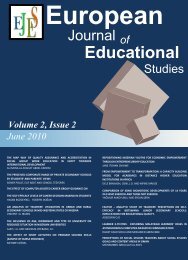principal's leadership behaviour as a determinant of effectiveness
principal's leadership behaviour as a determinant of effectiveness
principal's leadership behaviour as a determinant of effectiveness
You also want an ePaper? Increase the reach of your titles
YUMPU automatically turns print PDFs into web optimized ePapers that Google loves.
Europan Journal <strong>of</strong> Educational Studies 2(1), 2010<br />
The study also revealed that there w<strong>as</strong> significant relationship between principal’s <strong>leadership</strong> <strong>behaviour</strong> and<br />
secondary school <strong>effectiveness</strong>. The re<strong>as</strong>on for this might be due to the fact that principals are the men at the<br />
helms <strong>of</strong> the affairs <strong>of</strong> the schools and would always want the schools to achieve the goals for which they are<br />
established. Where the principals provide a good <strong>leadership</strong> <strong>of</strong> the school, sees to members <strong>of</strong> staff welfare,<br />
relates very well with both the teachers and the students, this will facilitate conducive environment for teaching<br />
and learning. This finding is in support <strong>of</strong> Purkey and Smith (1983) and Cruz (1985).<br />
CONCLUSION and RECOMMENDATIONS<br />
B<strong>as</strong>ed on the findings <strong>of</strong> this study, it w<strong>as</strong> concluded that the <strong>leadership</strong> <strong>behaviour</strong> <strong>of</strong> the principals in secondary<br />
schools in southwest Nigeria is very encouraging which depicts the transformational leader. It w<strong>as</strong> also<br />
concluded that the schools were effective in the affective and the psychomotor domains but not effective in the<br />
cognitive domain.<br />
It w<strong>as</strong> recommended that school principals should not relent in their efforts in sustaining the <strong>leadership</strong><br />
<strong>behaviour</strong> in the school system. It w<strong>as</strong> also recommended that the government and all the stakeholders in the<br />
secondary education system should also try to uphold the tempo <strong>of</strong> the performance <strong>of</strong> the students in the<br />
affective and the psychomotor domains while frantic efforts should be made at improving upon the level <strong>of</strong><br />
cognitive achievement <strong>of</strong> the students. High level <strong>of</strong> performance in the three domains <strong>of</strong> learning is what the<br />
schools must strive to achieve.<br />
REFERENCES<br />
Adeyemi, T. O. (2008). Predicting students’ performance in senior secondary certificate examination from<br />
performance in junior secondary certificate examinations in Ondo State, Nigeria. Humanity and Social<br />
Science Journal 3(1) 26-36.<br />
Ajayi, I. A. (2002). Resource factors <strong>as</strong> correlates <strong>of</strong> secondary school <strong>effectiveness</strong> in Ekiti State. Nigeria<br />
Journal <strong>of</strong> Counselling and Applied Psychology 1(1) 109-115.<br />
Babayemi, A. (2006). Principalship. In J. B. Babalola, A. O. Ayeni, S. O. Adedeji, A. A. Suleiman and M. O.<br />
Arike Wuyo (Eds) Educational Management: Thoughts and Practice. Ibadan: Codat publications 242-<br />
261.<br />
Bandele, S. O. (2002). Administration <strong>of</strong> continuous <strong>as</strong>sessment in tertiary institutions in Nigeria. Journal <strong>of</strong><br />
Educational Foundations and Management 1(1) 289-296.<br />
Cruz, P. A. (1995). The <strong>leadership</strong> actions <strong>of</strong> principals in schools that have experienced academic success with<br />
Hispanic students. Dissertation Abstracts International.<br />
Federal Government <strong>of</strong> Nigeria (2004). National Policy on education. Lagos: National Education Research<br />
Development Council.<br />
Ibukun, W. O. (1997). Educational Management: Theory and Practice. Lagos: Greenline publishers.<br />
Oladele, A. B. (2003). The justification for the inclusion <strong>of</strong> philosophy in Nigerian secondary school<br />
curriculum. Journal <strong>of</strong> Educational Foundation and Management 3(1) 1-14.<br />
Purkey, S. C. & Smith, M. S. (1983). Effective schools: A review, Elementary School Journal 83(4) 427-452.<br />
Scheerens, J. & Creemers, B. P.M. (1989). Conceptualizing school <strong>effectiveness</strong>. International Journal <strong>of</strong><br />
Educational Research 13(7) 691-706.<br />
Weber, G. (1971). Intercity children can be taught to read: Four successful schools. W<strong>as</strong>hington D. C: Council<br />
for B<strong>as</strong>ic Education.<br />
West African Examination Council (2007). Chief Examiner’s report.<br />
30

















